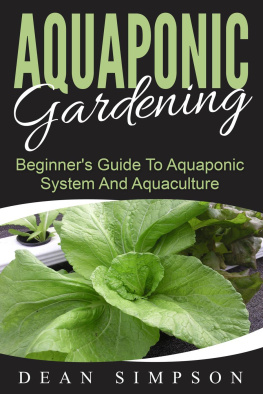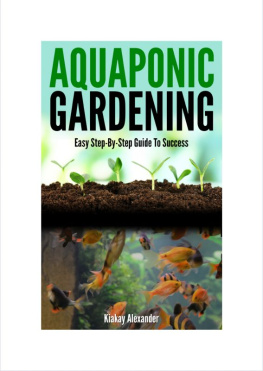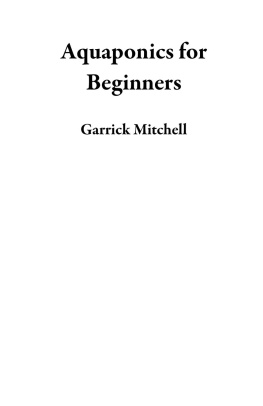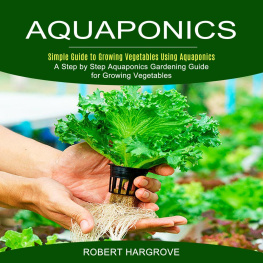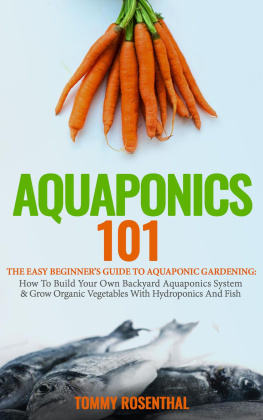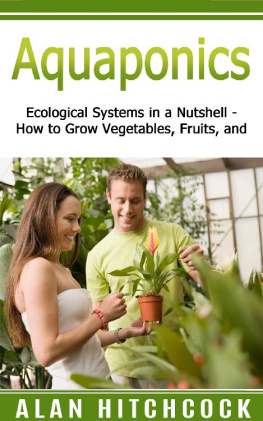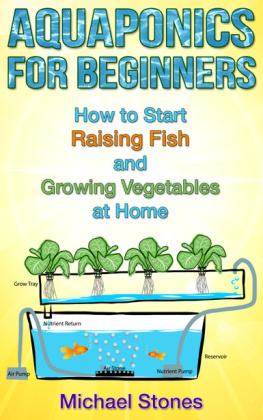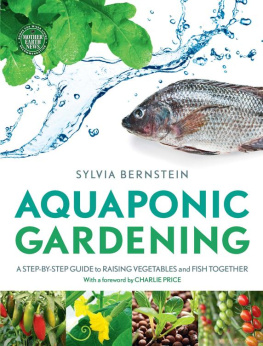William Walsworth - Aquaponics: Everything You Need to Know to Start an Expert DIY Aquaponic System from Home (Hydroponics, Organic Gardening, Self sufficiency)
Here you can read online William Walsworth - Aquaponics: Everything You Need to Know to Start an Expert DIY Aquaponic System from Home (Hydroponics, Organic Gardening, Self sufficiency) full text of the book (entire story) in english for free. Download pdf and epub, get meaning, cover and reviews about this ebook. year: 2016, publisher: Createspace Independent Publishing Platform, genre: Children. Description of the work, (preface) as well as reviews are available. Best literature library LitArk.com created for fans of good reading and offers a wide selection of genres:
Romance novel
Science fiction
Adventure
Detective
Science
History
Home and family
Prose
Art
Politics
Computer
Non-fiction
Religion
Business
Children
Humor
Choose a favorite category and find really read worthwhile books. Enjoy immersion in the world of imagination, feel the emotions of the characters or learn something new for yourself, make an fascinating discovery.

- Book:Aquaponics: Everything You Need to Know to Start an Expert DIY Aquaponic System from Home (Hydroponics, Organic Gardening, Self sufficiency)
- Author:
- Publisher:Createspace Independent Publishing Platform
- Genre:
- Year:2016
- Rating:5 / 5
- Favourites:Add to favourites
- Your mark:
Aquaponics: Everything You Need to Know to Start an Expert DIY Aquaponic System from Home (Hydroponics, Organic Gardening, Self sufficiency): summary, description and annotation
We offer to read an annotation, description, summary or preface (depends on what the author of the book "Aquaponics: Everything You Need to Know to Start an Expert DIY Aquaponic System from Home (Hydroponics, Organic Gardening, Self sufficiency)" wrote himself). If you haven't found the necessary information about the book — write in the comments, we will try to find it.
Are you interested in growing plants together with fishes?
Do you want to learn how to start your own Aquaponics System?
Are you interested in an Exact Blueprint on how to build an Aquaponics System from scratch?
If you answered YES to any of the above questions, thisAquaponicsbook is the book for you! This guidebook was designed as an introductory book, based around an exact building plan for multiple different aquaponic systems. The book has specifically been written from a beginners perspective, so anyone can understand the process. If you are interested to learn about the benefits of aquaponics gardening and want to be inspired by soil-free garden ideas, this guide will certainly be beneficial to you.
The following topics are covered in this book:
An EXACT blueprint on how to build your own aquaponics system and garden Inspirational designs on how to shape your own aquaponics garden to your needs The key benefits of using a aquaponics system in for growing Useful tips on how to optimize your aquaponics system How to achieve optimal growing conditions What common mistakes to avoid when building your aquaponics system
These are just SOME of the topics that are covered in this book! Starting an organic aquaponic garden is not only a lifestyle choice, it is also a healthy choice. Freshly harvested organic vegetables are packed with healthy vitamins, minerals and other building blocks for a super-healthy lifestyle. Having your own aquaponics garden is also both a great learning project for children, as well as a lovely outdoor hobby for adults.
Discover the opportunities of the aquaponic gardening life...
This book will introduce you to a world where you will see growing vegetables, herbs and berries in a different light. Forget those perfectly shaped, processed and pre-packaged products from your local supermarket, naturally produced foods are way more healthy and tasty! After starting out with the expert blueprint discussed in this book, it will be a piece of cake for you to branch out into a large aquaponics garden full of delicious, fresh and homemade foods.
Interested to learn more? Scroll to the top of the page and select theADD TO CARTbutton to start reading immediately!
---
Tags: Organic vegetable garden, gardening for beginners, vegetable home garden, organic gardening, home garden, backyard farm, homesteading, urban homestead, permaculture, self sufficiency, perennial vegetables, aquaponics, herbal garden, gardening books, berries, canning, food preservation, tomatoes, carrots, beets, beginners gardening, horticulture, landscape, botanical, plant, hydrofarm, budget, money, time, cannabis, aquaponic garden made easy.
William Walsworth: author's other books
Who wrote Aquaponics: Everything You Need to Know to Start an Expert DIY Aquaponic System from Home (Hydroponics, Organic Gardening, Self sufficiency)? Find out the surname, the name of the author of the book and a list of all author's works by series.

